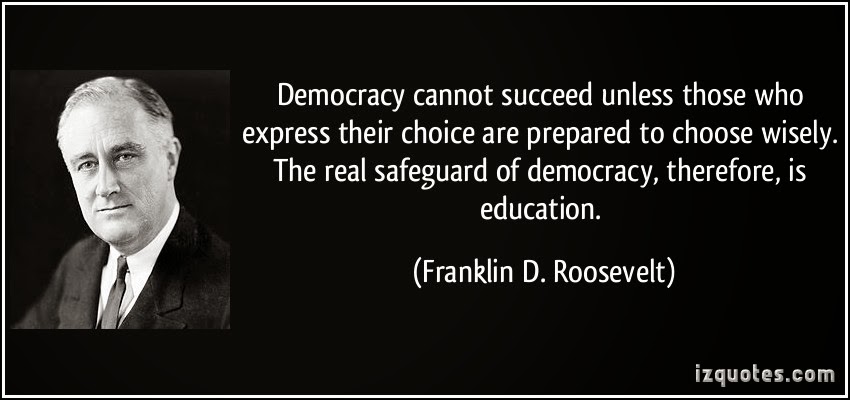Among economists and political scientists, the
importance of democracy on economic growth is very arguable; some think that
democracy is good for only developed countries, and it is neutral, perhaps
negative, to economic growth in impoverished countries compared to other
autocratic countries which have proficient governments such as China, while the
others are of opinion that democracy leads to significant increase of economic
growth, even developing countries. However, nowadays, there are much more
researches supporting support the second view that actually democracy is able
to help countries develop its economic effectively.
From the research of Daron Acemoglu, Suresh
Naidu, James A Robinson and Pascual Restrepo “Democracy causes economicdevelopment?” which is published on VOX website, not only autocracy countries
with good governments can make a positive growth on GDP per capita, but also democratic
countries. This argument is supported by certain evidences, provided in their work,
of non-democratic countries which have changed their regimes to democracy, and
they succeeded in bringing about considerable rise of GDP per capita.
Although capitalism and democracy are economic
system and regime which are mostly used throughout the world, there still are
many economists and social scientists believe that autocracy are better for
economic growth, if those autocratic countries have good governments. For
example, China under the leading of Deng Xiaoping had a great growth in GDP as
well as modern China’s economic which has grown continually under Xi Jinping. However,
as I mentioned above, with today’s knowledge, aside from autocracy, democracy
can enhance economic growth as well. Therefore, to answer which regime are the
most useful for countries we should concern about further factors besides
increase of GDP.
A number of researches show that, on the one
hand, economic growths of countries under autocracy fluctuate wildly over the
time; in other words, if autocratic countries are under the control of good
leader, they will considerably benefit from appropriate policies, but,
reversely, their economic will extremely be hindered in case they get a bad
leader. On the other hand, the growths of democratic countries are more stable,
but in the average term growths of the both regimes are nearly equal. This means
that regarding risk in economic growth, democracy is better than autocracy to
people who are risk avoiders – and most behavioral economic researches prove that
the majority of people are risk avoiders, whereas just some people are risk
takers.
Moreover, though autocracy can accelerate
economic growth, there is something lost by this regime. For Instance, Germany
under tenure of Adolf Hitler, Fascism dictator, was very powerful, but this
great had to trade-off with invaluable things like lives of Jews. This World
War II tragedy occurred because no one knew what Hitler did to bring German to
power. It is very easy to control people, so there is nobody can act against
Dictators, and sometimes it leads to miserable disaster. Note that under
autocracy the effect “polarisation”, which I commented in Pop’s
blogpost “Really? Can you explain it to me?” can take place easily.
Therefore, to me, on a regular basis, democracy is better than
autocracy due to all reasons taken. However, all of my arguments base on today’s
knowledge, so if in the future new breakthrough knowledge take place, my
opinion may change.
__________
Reference
Acemoglu, D. Naidu, S. Restrepo, P. Robinson, J. (2014, May 19). Democracy causes economic development?. Retrieved May 28, 2014 from VOX website : http://www.voxeu.org/article/democracy-and-growth-new-evidence
Visuthisakchai S. (2014, May 23). Really? Can you explain it to me?. Peter AEP Blogspot. Retrived May 28, 2014 from http://peteraep.blogspot.com/2014/05/pollution-absorbing-poster.html


in this response, i often mention about other researches, but i really cannot recall where i got that information, because i got it when i studied in universiy. it's a long time. it makes my response noticably weaker. sorry about that
ReplyDeleteI don't think it's a major problem in a blog post (it's not a research paper), but I am also glad you are worrying about this.
DeleteI like P's main points, which seem to me to be that democracy offers benefits that are very practically as well as morally better than the alternatives.
ReplyDeleteBut I've only had time for one quick reading, and as P also reminds me, with his reference to Pop's post, I might not have a sufficient depth of understanding of P's ideas yet.
I'll read it again more carefully with my afternoon coffee, and perhaps comment in more detail.
Or perhaps I'll later be able to comment on the comments of others.
DeleteSometimes I wonder 'is democracy really good for our country?' Because some of our people don't get enough education, so they tend to be persuaded very easily. And that leads to buying-selling votes, also a corruption.
ReplyDeleteOn the other hand, I think we shouldn't treat people differently, because it will turn out to be 'educationism' or something like that. As a result, I think democracy is still the best of all choices. But you must give people enough education first.